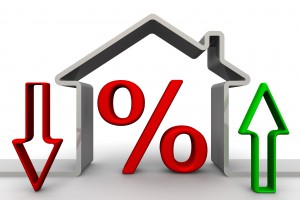Is it time to lock in some or all of your loans into fixed rates?
This is a question many property investors and home owners are asking with interest rates at virtually the lowest they’ve been in decades and, despite APRA’s intervention, some banks delivering us some very attractive fixed loan rates.
How do you decide what’s right for you?
And what do you need to consider to ensure you make an informed decision?
I don’t think interest rates are going to rise any time soon.
In fact the market is factoring them in to be steady for the next few months
I don’t think interest rates will rise any time soon because in the past, despite getting the best advice from experts in this field, most times I’ve locked in on fixed rates I’ve got it wrong.
So maybe the fact that I was planning to lock in a few weeks ago was a sign that rates will fall further (a bit like washing my car is a sure way to make it rain.)
Of course “locking into” a fixed rate home or investment loan gives you the advantage of knowing what your commitments will be for a predetermined period – the fixed term.
This could be a suitable strategy if you want certainty for your cash flow commitments – especially with the likelihood that interest rates will eventually increase significantly.
However there are also disadvantages that you need to be aware of before you make a decision.
With this in mind…
Here are 7 questions you should ask yourself when considering whether to fix your loans
1. Will I want to sell my property during the fixed loan period?
If so there could be a penalty for breaking your loan commitment.
2. Will I want to access the equity in my property to invest further during the fixed period?
Often this will come at a cost that may be prohibitive.
3. Do I need an offset account?
An offset account is a transaction account linked to your loan.
Many borrowers put their savings into this account and the credit balance here is offset against your outstanding loan balance reducing the interest payable on that loan. Most fixed rate loans do not allow an offset facility.
4. Can I make extra repayments off my loan?
As some lenders will restrict how much extra you can repay each year when you fix your loan, if you are able to save significant amounts you may consider leaving some of your mortgage variable and maximising the use of your offset account.
5. What balance of fixed and variable rates do I need for my portfolio?
Even if you only have one loan, you can usually split the facility with a portion being fixed and the rest being a variable loan, giving you the flexibility you need.
Often beginning investors choose to lock in 50% of their loans, while investors with larger portfolios protect themselves by fixing a larger percentage of their loans.
6. How long should I fix my loan for?
Now this is a difficult question, but if you believe that interest rates won’t increase for a year or two and after that they will remain high for a number of years, then fixing for a short period such as one or two years may not make sense. 
That’s because your loan facility will mature and revert to the prevailing interest rate at a time when they could be a few percentage points higher.
This is an area where you should take specialist advice.
7. If interest rates fall further, what will locking in today have cost me?
How would you feel if you’d locked in to a five-year loan facility and interest rates dropped further?
I know when I’ve been in that situation I took comfort in the fact that I was not trying to beat the banks; instead I had secured my cash flow position.
Yet I know others who have become stressed when rates turned against them.
Now a disclaimer…
I’m clearly no expert in this field (as I said…I often get the fixed vs variable decision wrong) so please get expert advice regarding your own circumstances.
You see…
There are many other issues to consider – things like your job security –and speculating on rate movements is fraught with danger and making a fixed versus variable decision for the wrong reasons can be costly.
While fixing your rate has the benefit of achieving “certainty” with your mortgage repayments, breaking a fixed rate loan can be costly as well as removing flexibility and control.
Choose wisely because you’ll only know if you’ve made the right decision in 3 or 4 years.
But remember rates will rise again one day and as fixed rates tend to rise well ahead of variable rates, it’s worthwhile keeping an eye on the leading indicators of our economy.
SO What CAN YOU do next?
If you’re looking for independent property investment advice, no one can help you quite like the independent property investment strategists at Metropole.
Remember the multi award winning team of property investment strategists at Metropole have no properties to sell, so their advice is unbiased.
Whether you are a beginner or a seasoned property investor, we would love to help you formulate an investment strategy or do a review of your existing portfolio, and help you take your property investment to the next level.
Please click here to organise a time for a chat.
Or call us on 1300 20 30 30.
When you attend our offices in Melbourne, Sydney or Brisbane you will receive a free copy of my latest 2 x DVD program Building Wealth through Property Investment in the new Economy valued at $49.


No comments:
Post a Comment